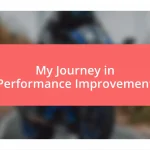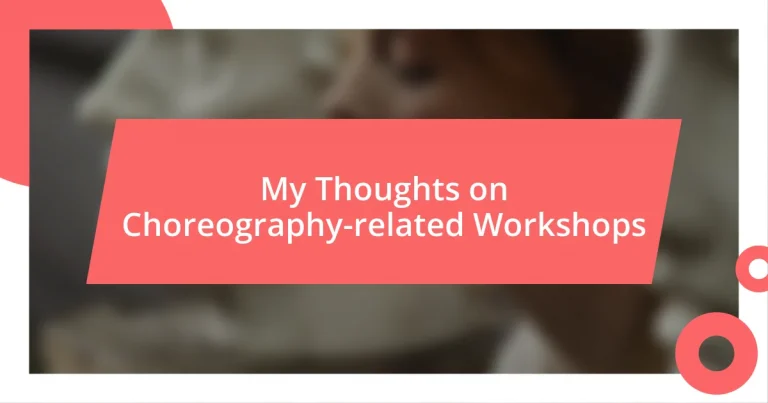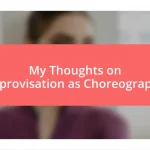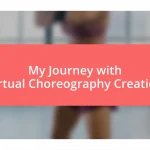Key takeaways:
- Choreography workshops enhance skill development, foster community, and encourage exploration of diverse dance styles and techniques.
- Key skills developed include collaboration, adaptability, and self-expression, which are essential for growth in the dance industry.
- Maximizing workshop experiences involves being open-minded, seeking feedback, documenting insights, and pursuing follow-up opportunities for continued learning and connection.
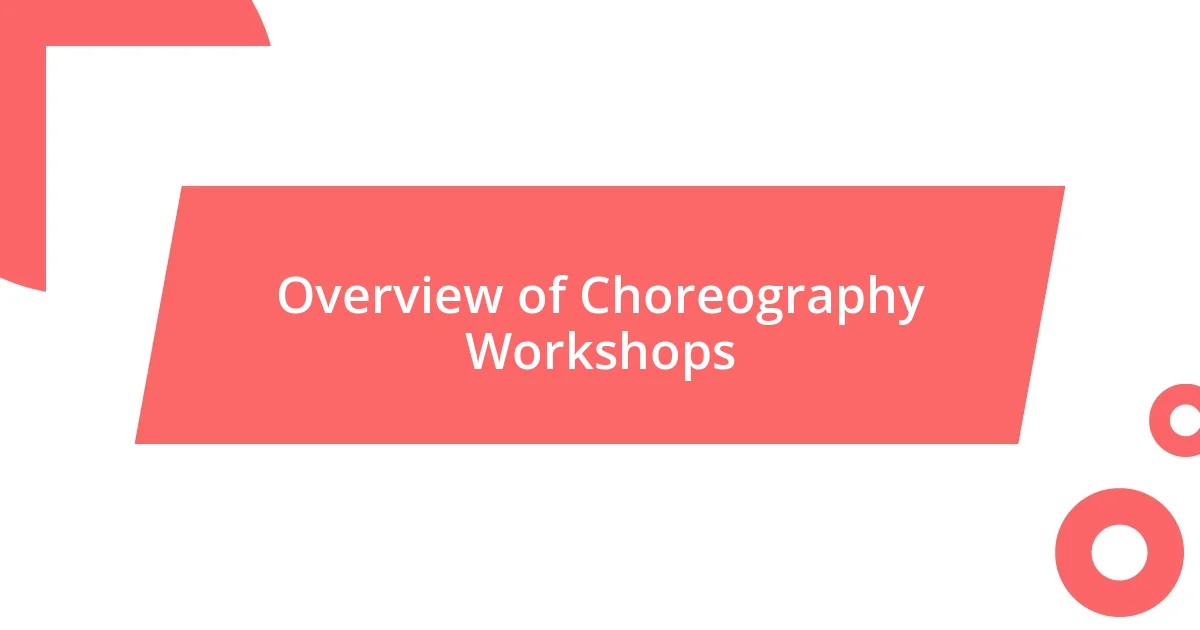
Overview of Choreography Workshops
Choreography workshops offer a unique platform for dancers and enthusiasts to explore movement in a creative environment. I remember my first workshop; it was exhilarating to be surrounded by fellow dancers who shared the same passion and drive. The energy in the room was palpable, and it felt like we all spoke the same language without needing words.
In these workshops, participants often learn various styles and techniques, allowing them to expand their repertoire. Have you ever taken a class that completely shifted your perspective? I know I have! One workshop introduced me to contemporary dance, which opened up a world of expression I had never considered before. This experience taught me the value of stepping outside one’s comfort zone, embracing new forms of artistry.
Furthermore, choreography workshops aren’t just about learning steps; they foster collaboration and creativity. The camaraderie that develops among participants can be truly inspiring. I’ve forged lasting friendships through these workshops, driven by our shared experiences and a collective passion for storytelling through movement. Isn’t it fascinating how dance connects us on such a personal level?
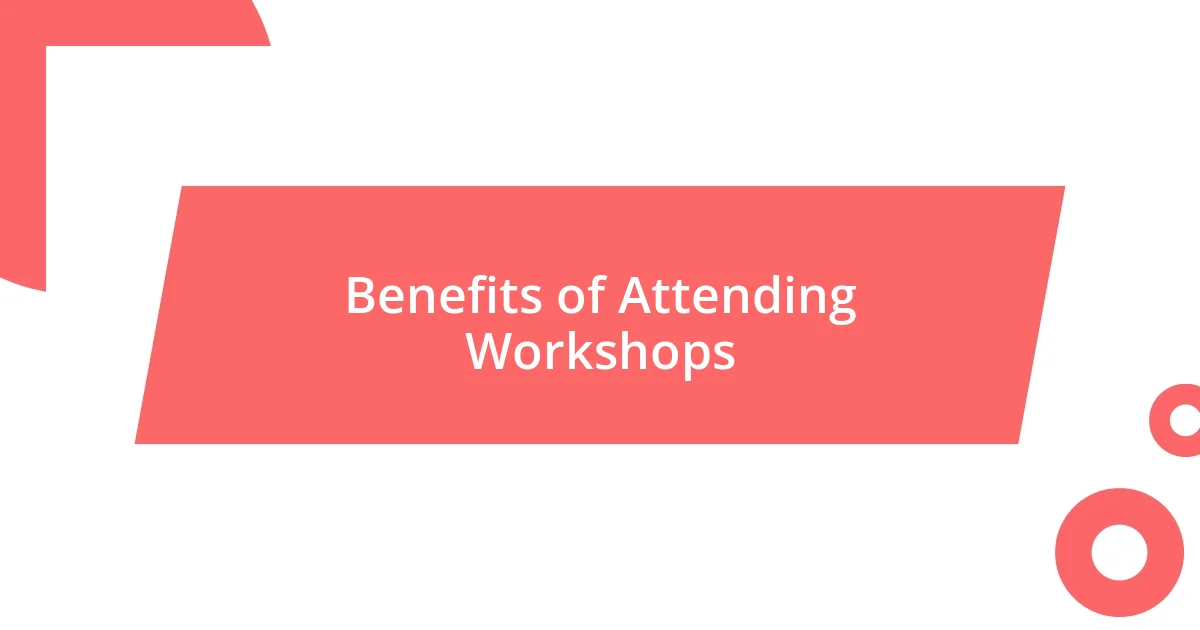
Benefits of Attending Workshops
Attending workshops can profoundly impact a dancer’s skill development and artistic expression. I remember a workshop where a professional choreographer personally guided us through intricate sequences. That level of direct feedback helped me refine my technique in ways I never expected. It’s incredible how the right instructor can ignite a spark that propels you forward in your dance journey.
Another remarkable benefit is the sense of community that blossoms in these settings. I often find myself sharing moments of vulnerability with my fellow dancers, whether it’s nailing a new move or struggling to grasp a concept. These shared experiences create a bond that goes beyond dance; they build a support network where encouragement thrives. Have you ever left a workshop feeling inspired by a new friend? I certainly have, and those connections often continue beyond the class.
Workshops also present opportunities to explore new themes, styles, or even choreography techniques. I once attended a hip-hop workshop that challenged my usual contemporary background. It was refreshing to learn how to infuse storytelling into rhythmic movement. This experience reminded me that every style has its own unique language, and it’s worth learning how to speak many of them fluently.
| Benefit | Description |
|---|---|
| Skill Development | Hands-on instruction from professional choreographers enhances technique and artistic growth. |
| Sense of Community | Building connections and friendships foster a supportive network among dancers. |
| Exploration of Styles | Workshops encourage experimentation with new dance forms and themes, enriching creative expression. |
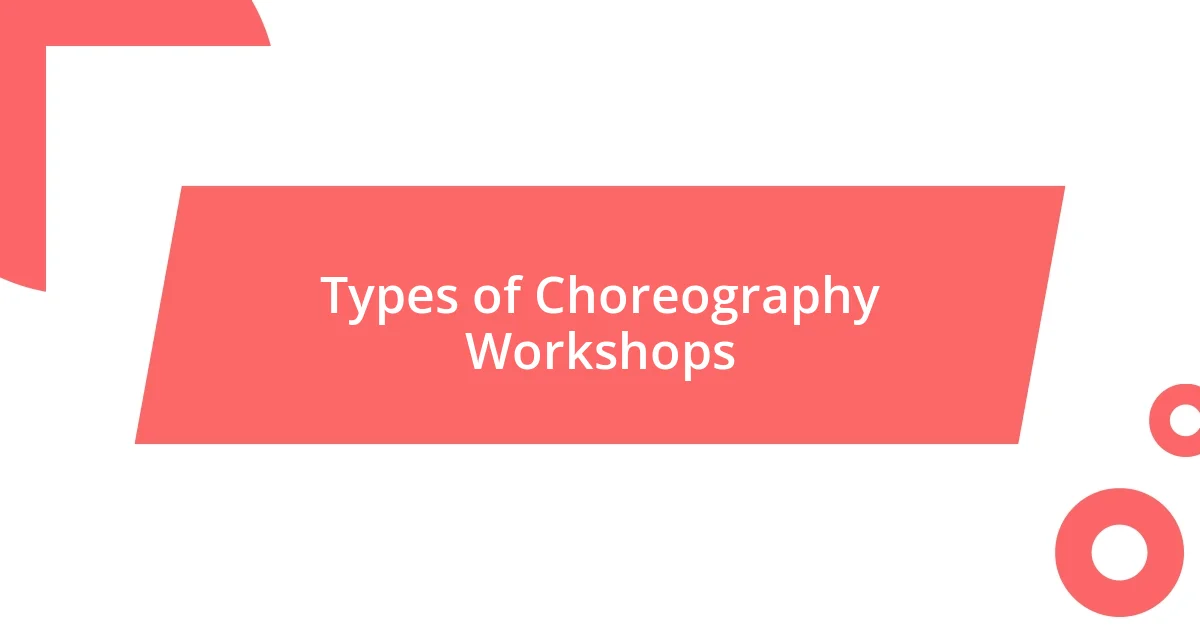
Types of Choreography Workshops
Choreography workshops come in various shapes and sizes, each serving a unique purpose for dancers eager to deepen their craft. I’ve participated in specialized workshops focused solely on a single style, like ballet or jazz, which allowed me to drill down into the nuances of those forms. In contrast, I also attended interdisciplinary workshops that blended multiple styles, broadening my perspective and helping me discover unexpected connections between them. This versatility truly reflects how workshops can cater to diverse interests and skill levels.
Here are some common types of choreography workshops one might encounter:
– Style-Specific Workshops: Focused on individual dance forms, these sessions dive deep into techniques and expressions specific to styles like hip-hop or tango.
– Interdisciplinary Workshops: Offering mixed styles, these classes encourage experimentation and creativity, allowing dancers to fuse different genres.
– Choreography Creation Workshops: Centered on the process of creating original pieces, these workshops are ideal for dancers seeking to contribute their unique voices to the art.
– Performance Workshops: These sessions train dancers not only in choreography but also in stage presence and performance techniques, enhancing their overall performance skills.
– Competitor Coaching Workshops: Tailored for those preparing for competition, these workshops focus on skills necessary for competing, such as musicality and precision.
Reflecting on my experience, I recall a choreography creation workshop where we were tasked with developing a piece based on personal stories. It was cathartic to transform my feelings into movement, and I was amazed by how everyone opened up during the process. This kind of vulnerability is the magic of workshops; they create a safe space for artistic exploration and personal growth.
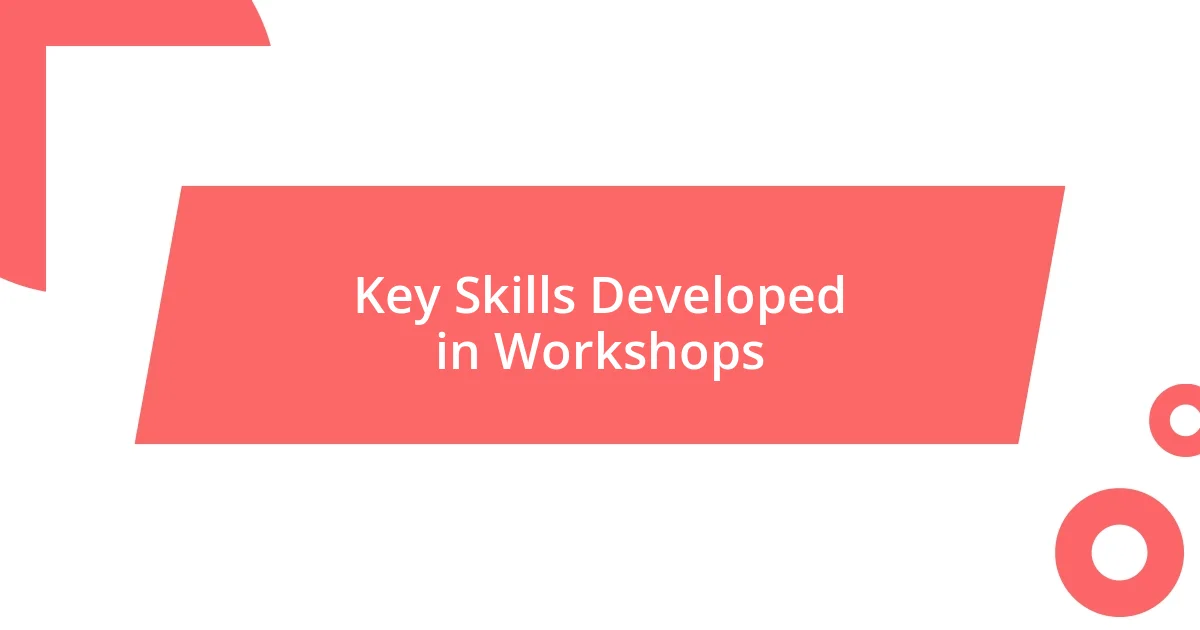
Key Skills Developed in Workshops
Participating in choreography workshops has honed my ability to collaborate with others, which is a vital skill in the dance industry. I vividly recall a session where we had to create a group piece on the spot. The challenge of merging our varying styles taught me the importance of compromise and communication. Have you ever encountered a moment where your creativity blossomed through teamwork? I certainly have, and it’s a reminder that sharing ideas can lead to extraordinary outcomes.
Another skill I developed through workshops is adaptability. I remember a specific session where the music suddenly changed, and we had to adjust our movements on the fly. That experience highlighted how crucial it is to stay flexible and responsive, especially within a live performance context. How comfortable are you with spontaneity in dance? I find that embracing the unexpected can often spark innovative ideas.
Last but not least, workshops have deepened my understanding of self-expression. During a session focused on emotional storytelling, I had the chance to explore movement linked to personal experiences. This exploration made me reflect on how our stories can translate into vivid choreography. Have you ever felt a connection between your life and your movements? I certainly believe that the more we delve into our emotions, the more authentic our dance becomes.
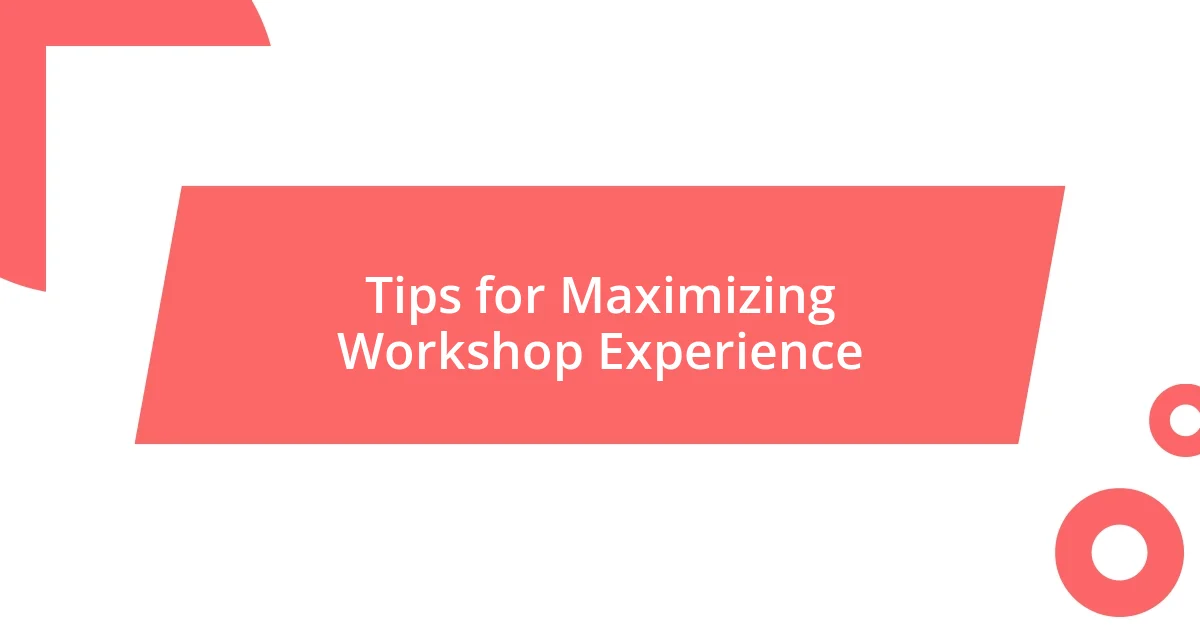
Tips for Maximizing Workshop Experience
To maximize your experience in choreography workshops, it’s essential to approach them with an open mind. I remember walking into my first workshop with a mix of excitement and nerves. Embracing vulnerability allowed me to connect with other dancers and learn from their diverse perspectives. Have you ever felt hesitant to share your ideas? Don’t let that stop you; the more you engage, the richer your experience will be.
One tip I can offer is to actively seek feedback from instructors and peers. During a workshop focused on improvisation, I found myself surprised at the invaluable insights I received. Constructive criticism can feel intimidating, but it’s a powerful tool for growth. How often do you ask for feedback in your dance journey? I’ve learned that welcoming these conversations not only enhances my skills but also fosters a sense of community among participants.
Lastly, don’t forget to document your experiences. After a choreography workshop, I started keeping a journal dedicated to my thoughts and feelings about what I learned. It might seem simple, but this practice deepened my understanding of my artistic journey. Have you considered capturing your workshop insights? Reflecting on what resonated with you can clarify your goals and inspire future creativity.
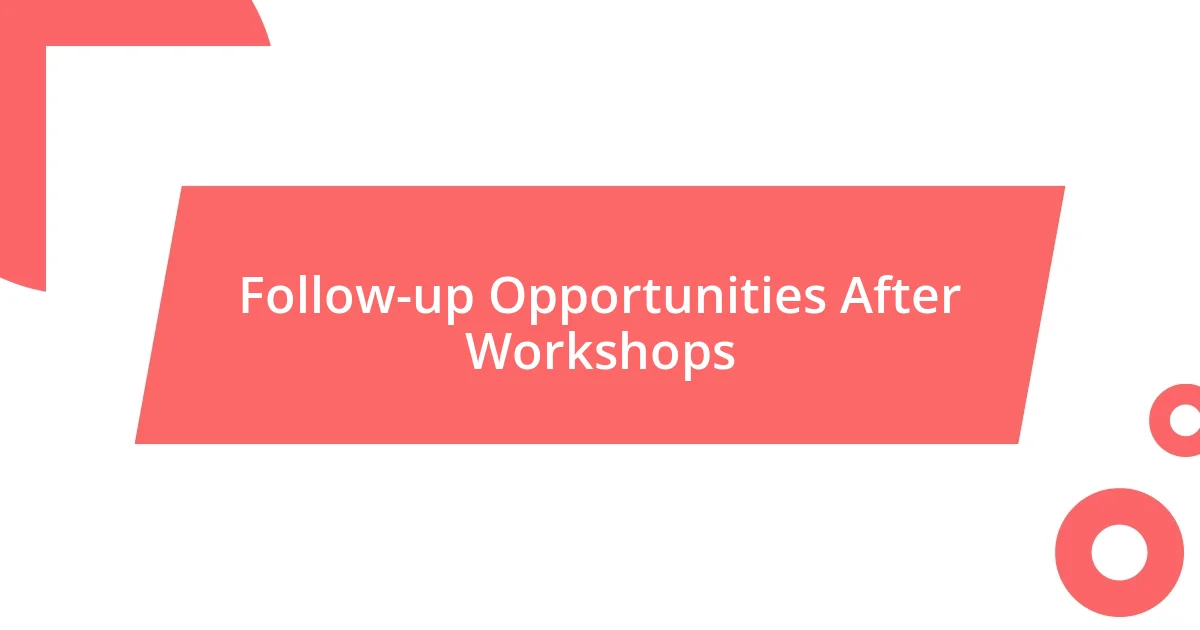
Follow-up Opportunities After Workshops
After attending a choreography workshop, one of the most rewarding follow-up opportunities is to form a study group with fellow participants. I’ve found that post-workshop collaborations can ignite creative sparks, especially when we brainstorm ideas together. Have you ever felt energized just by discussing what you learned with peers? I certainly have, and this collective brainstorming often leads to new projects that we might not have pursued alone.
Another avenue to explore is reaching out to the instructors. After one particularly transformative workshop, I decided to email the instructor to express my gratitude and ask for further resources on a specific technique we covered. To my surprise, she not only responded quickly but also shared some invaluable materials that profoundly enhanced my practice. Have you considered how a simple follow-up could open doors? This kind of outreach can foster ongoing mentorship and provide you with guidance during your dance journey.
Lastly, I encourage you to take what you’ve learned and share it through social media or blogs. Following a workshop, I started posting short videos showcasing the choreography I developed based on new techniques. This not only solidified my understanding but also allowed me to connect with a wider community. How do you express your experiences creatively? By sharing your journey, you inspire others while also challenging yourself to grow in the process.



